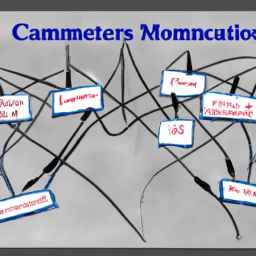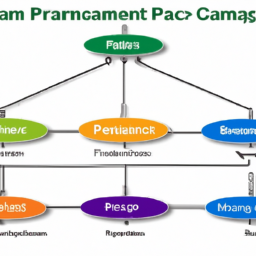Are you tired of the never-ending wait times at your doctor’s office? Well, fear not, because in the world of healthcare, project schedule management is here to save the day!
Picture this: a bustling hospital where everything runs like clockwork, appointments are on time, and medical technologies are seamlessly integrated. Sounds like a dream, right? Well, thanks to efficient project schedule management, this dream can become a reality.
In this article, we will delve into the fascinating world of project schedule management in the healthcare industry, using real-life case studies to showcase its impact. From the implementation of new medical technologies to the construction of healthcare facilities, we will explore the challenges faced in managing project schedules and the strategies employed to overcome them. Along the way, we will uncover valuable lessons learned and highlight the significance of efficient project scheduling in delivering high-quality healthcare services.
So, grab a cup of coffee and get ready to dive into the world of project schedule management in healthcare. It’s time to revolutionize the way healthcare is delivered!
Key Takeaways
- Efficient project schedule management is crucial in the healthcare industry to improve efficiency and deliver high-quality healthcare services.
- Telemedicine and artificial intelligence integration are important developments in the healthcare industry that can benefit from effective project schedule management.
- Considerations in project scheduling for healthcare facilities include patient flow and equipment placement.
- Involving key stakeholders in project scheduling is essential to address their needs and minimize disruptions to patient care.
Implementation of New Medical Technologies
Now you’re ready to tackle the implementation of those cutting-edge medical technologies that will revolutionize patient care.
The first step in this process is the adoption of telemedicine, which allows healthcare professionals to provide remote consultations and monitor patients from a distance. This technology not only improves access to care for patients in remote areas but also reduces the burden on hospitals and clinics by minimizing unnecessary visits.
Additionally, the integration of artificial intelligence into healthcare systems enhances diagnostic accuracy and efficiency. AI algorithms can analyze vast amounts of patient data and provide valuable insights to healthcare providers, leading to more accurate diagnoses and personalized treatment plans.
With these advancements in place, we can now transition into the subsequent section about the construction of healthcare facilities.
Construction of Healthcare Facilities
Start by envisioning yourself as part of the team constructing healthcare facilities, where you get to witness firsthand the incredible progress and transformation happening before your eyes. Building design plays a crucial role in creating functional and efficient healthcare facilities. The design process involves careful consideration of patient flow, staff accessibility, and equipment placement.
Every detail, from the layout of patient rooms to the location of medical supply storage, is carefully planned to ensure optimal efficiency and patient care. Once the design is finalized, construction begins, and it’s your responsibility to oversee facility maintenance. This includes ensuring that all systems, such as HVAC and electrical, are functioning properly and conducting regular inspections to identify any potential issues.
As you transition into the subsequent section about challenges in managing project schedules in healthcare settings, it becomes evident that the construction of healthcare facilities requires meticulous planning and coordination to meet the demands of the industry.
Challenges in Managing Project Schedules in Healthcare Settings
Amidst the intricate dance of juggling multiple moving parts, orchestrating the symphony of construction timelines in healthcare settings is like conducting a delicate ballet. The challenges of managing project schedules in healthcare settings are numerous and require careful attention to resource allocation and stakeholder engagement.
Resource Allocation:
- Limited availability of healthcare professionals and specialized equipment can lead to scheduling conflicts and delays.
- Balancing the allocation of resources between ongoing patient care and construction activities can be a complex task.
Stakeholder Engagement:
- Involving key stakeholders, such as hospital administrators, healthcare staff, and patients, is crucial for successful project schedule management.
- Regular communication and collaboration with stakeholders ensure their needs and concerns are addressed, minimizing disruptions to patient care.
Transitioning into the subsequent section about ‘strategies employed in project schedule management,’ healthcare organizations employ various techniques to tackle these challenges and ensure smooth construction timelines.
Strategies Employed in Project Schedule Management
To effectively navigate the intricacies of project scheduling in healthcare settings, you need to employ a range of strategic techniques that address resource limitations and engage key stakeholders.
In the healthcare industry, where time is of the essence and patient care is paramount, it’s crucial to have a well-structured project schedule management plan in place.
One strategy is to prioritize tasks based on urgency and importance, ensuring that critical activities are completed on time.
Another approach is to use project management software that allows for real-time collaboration and tracking of progress.
Additionally, regular communication and coordination with stakeholders, such as healthcare providers and administrators, can help ensure that everyone is aligned and aware of project timelines and milestones.
By employing these strategies, project schedule management in the healthcare industry can be more efficient and effective in delivering successful outcomes.
Transitioning into the subsequent section about lessons learned from real-life case studies, it becomes evident that implementing these strategies can lead to valuable insights and improvements in project scheduling practices.
Lessons Learned from Real-Life Case Studies
One key takeaway from real-life experiences is that effective project scheduling techniques can lead to valuable lessons and improvements in how we navigate and coordinate tasks in healthcare settings.
Real-life case studies have shown that by carefully planning and managing project schedules, healthcare organizations can minimize delays, optimize resource allocation, and enhance overall efficiency.
Lessons learned from these experiences emphasize the importance of conducting thorough assessments of project requirements, accurately estimating time and resource needs, and proactively identifying potential risks and challenges.
By learning from past mistakes and successes, healthcare professionals can develop strategies to streamline project schedules, improve communication and collaboration among team members, and deliver high-quality healthcare services more effectively.
These lessons highlight the significance of efficient project scheduling in ensuring timely and successful project completion, ultimately leading to improved patient care and outcomes.
Significance of Efficient Project Scheduling in Delivering High-Quality Healthcare Services
Now that you have learned about the lessons learned from real-life case studies in project schedule management in the healthcare industry, let’s delve into the significance of efficient project scheduling in delivering high-quality healthcare services. Efficient project scheduling plays a crucial role in ensuring patient satisfaction and cost-effective resource allocation in the healthcare industry. By carefully planning and organizing project schedules, healthcare providers can optimize the use of resources, such as staff, equipment, and facilities, leading to improved efficiency and reduced costs. This, in turn, allows for the timely delivery of high-quality healthcare services, meeting the needs and expectations of patients. To illustrate the impact of efficient project scheduling, consider the following table:
| Impact of Efficient Project Scheduling in Healthcare |
|---|
| Enhanced patient satisfaction |
| Reduced costs |
| Optimal resource utilization |
| Timely delivery of healthcare services |
By prioritizing efficient project scheduling, healthcare organizations can effectively meet the demands of patients while ensuring cost-effective resource allocation.
Frequently Asked Questions
How does the implementation of new medical technologies impact project schedules in the healthcare industry?
The implementation of new medical technologies can have a significant impact on project schedules in the healthcare industry. These technologies often require specialized training and installation, which can cause delays in project timelines.
Additionally, unforeseen technical issues or compatibility challenges may arise, leading to further delays and potential cost overruns. It’s crucial for project managers to carefully plan and allocate resources to mitigate these risks and ensure the successful implementation of new medical technologies.
What are the key factors to consider when constructing healthcare facilities to ensure efficient project scheduling?
To ensure efficient project scheduling in healthcare facility construction, consider key factors such as efficient resource allocation and budget management.
Efficient resource allocation involves optimizing the use of personnel, equipment, and materials to minimize waste and delays.
Budget management involves carefully controlling costs and expenses to stay within financial constraints.
By prioritizing these factors, healthcare facilities can streamline their project schedules, reducing the potential for delays and cost overruns.
Efficient project scheduling ultimately leads to timely completion and successful implementation of healthcare facility construction projects.
What are some common challenges faced in managing project schedules in healthcare settings?
Common challenges in managing project schedules in healthcare settings include resource allocation, coordination with multiple stakeholders, and dealing with unexpected delays. These challenges can impact the overall efficiency of the project and lead to cost overruns and delays in patient care.
However, the impact of technologies, such as project management software and electronic health records, can help mitigate these challenges by streamlining communication, enhancing data management, and enabling real-time monitoring of project progress.
What strategies are commonly employed in project schedule management in the healthcare industry?
To effectively manage project schedules in the healthcare industry, lean strategies are commonly employed. These strategies focus on eliminating waste and streamlining processes, ultimately improving efficiency.
Resource allocation is another key aspect, ensuring that the right resources are assigned to tasks at the right time. By implementing lean principles and optimizing resource allocation, healthcare organizations can navigate the complexities of project scheduling more effectively, leading to successful project outcomes and improved patient care.
Can you provide examples of real-life case studies that highlight the importance of efficient project scheduling in delivering high-quality healthcare services?
Efficient project scheduling case studies in the healthcare industry highlight the importance of project timelines in delivering high-quality healthcare services.
For example, a case study from a hospital shows how implementing a well-planned project schedule improved patient care by reducing waiting times and increasing efficiency in delivering treatments.
Another case study focuses on a healthcare organization that utilized effective project scheduling to streamline their operations, resulting in improved patient outcomes and cost savings.
These real-life examples emphasize the significant impact of efficient project scheduling on healthcare delivery.
Conclusion
In conclusion, the case studies presented highlight the importance of efficient project scheduling in the healthcare industry. From implementing new medical technologies to constructing healthcare facilities, managing project schedules is crucial for delivering high-quality healthcare services.
The strategies employed and lessons learned from real-life examples demonstrate the challenges faced and the solutions implemented. By employing effective project schedule management, healthcare organizations can ensure smooth operations, timely completion, and optimal use of resources.
So, seize the opportunity to streamline and succeed in the intricate world of healthcare project scheduling.



























